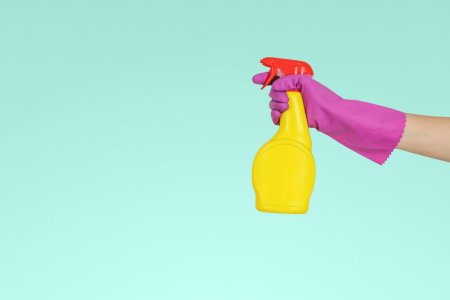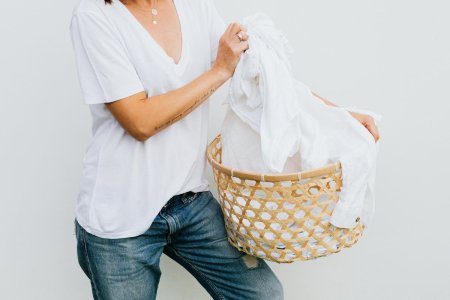Do these 'hacks' actually work? The truth behind the popular cleaning techniques on social media
When cleaning our homes, we often seek quick fixes and clever tricks to make our chores faster and easier.
And platforms like TikTok and Instagram seem full of ingenious tips. But we must beware: Many of these popular cleaning 'hacks' seen online have serious flaws—or just plain don't work.
It's no wonder these dubious tricks gain traction. Who wouldn't want an effortless way to dissolve grime and leave every surface gleaming?
After a long day, scrubbing stubborn stains can be the last thing we feel like doing. A sprinkling of household ingredients sounds easier than lugging out heavy-duty cleaners.
When an influencer shares their magic cleaning methods, the solution seems within reach. But often, these techniques aren't the time-savers they're cracked up to be.
Why don't many of these popular fixes deliver sparkling results?
The reasons vary but often come down to a lack of cleaning power.
Using Coca-Cola
Take using Coca-Cola to clean and remove stains. We know acids found in soft drinks can dissolve grime. But as cleaning experts point out, the small amounts of acidic juices in sodas we use lack the concentration to tackle stains and dirt seriously.
Plus, they leave behind sticky, streaky residue. Buying the proper cleaning products designed to clean and sanitise your home is better.
Mopping with boiling water
Other social media users claimed that mopping floors with boiling water is effective. However, they fail to mention that most floors were not designed to be cleaned by hot, boiling water.
Sealed hardwood floors will swell if mopped with hot water, and the glue holding the vinyl and laminated flooring in place will break down.
Unfortunately, some homeowners find this out too late since the damage doesn’t show up immediately.
Using aspirin tablets
You might have come across a video advising you to use ground aspirin tablets on white clothes to brighten them up. As with the examples mentioned, this method doesn’t work.
When aspirin comes in contact with water, it breaks into salicylic acid. While it has minor detergent properties, it doesn’t have bleaching properties. Sticking to the detergent from supermarkets or classic bleach is much better for brightening up your white clothes.
Cleaning with Magic Eraser
Some people might claim that using a magic eraser in a bowl to scrub around would help you eliminate the toilet’s stains. But this product doesn’t have any cleaning agents.
You see, magic erasers clean through ‘mechanical action’, or simply put, scrubbing.
Putting lemons in dishwashers and laundry
Lemons have long been lauded as effective ingredients for cleaning. With its acidity and fresh scent, it’s no wonder why many of these ‘TikTok hacks’ feature this fruit.
However, it was reported that a mere tablespoon of lemon juice would not impact your cleaning agenda. You might need to get ½ cup of lemon juice (which should be squeezed from approximately eight lemons) before seeing good results.
Using paper towels on Tupperware
And lastly, you might have heard that dishwashing liquid, water and paper towels would work wonders on your greasy, discoloured Tupperwares. But the truth is, it is only effective for some stains.
The Spruce claimed it would only work on fresh food stains on your containers. But this trick would not work if your Tupperwares had been sporting those stains for a while.
We know it’s easy to be tricked by easy ‘hacks’ online. We advise analysing the proposed method: Does it make chemical and practical sense or sound too good to be true? And when possible, test on inconspicuous spots before tackling visible areas.

Have you encountered an ineffective cleaning trick online, members? Share your experience in the comments below!
And platforms like TikTok and Instagram seem full of ingenious tips. But we must beware: Many of these popular cleaning 'hacks' seen online have serious flaws—or just plain don't work.
It's no wonder these dubious tricks gain traction. Who wouldn't want an effortless way to dissolve grime and leave every surface gleaming?
After a long day, scrubbing stubborn stains can be the last thing we feel like doing. A sprinkling of household ingredients sounds easier than lugging out heavy-duty cleaners.
When an influencer shares their magic cleaning methods, the solution seems within reach. But often, these techniques aren't the time-savers they're cracked up to be.
Why don't many of these popular fixes deliver sparkling results?
The reasons vary but often come down to a lack of cleaning power.
Using Coca-Cola
Take using Coca-Cola to clean and remove stains. We know acids found in soft drinks can dissolve grime. But as cleaning experts point out, the small amounts of acidic juices in sodas we use lack the concentration to tackle stains and dirt seriously.
Plus, they leave behind sticky, streaky residue. Buying the proper cleaning products designed to clean and sanitise your home is better.
Mopping with boiling water
Other social media users claimed that mopping floors with boiling water is effective. However, they fail to mention that most floors were not designed to be cleaned by hot, boiling water.
Sealed hardwood floors will swell if mopped with hot water, and the glue holding the vinyl and laminated flooring in place will break down.
Unfortunately, some homeowners find this out too late since the damage doesn’t show up immediately.
Using aspirin tablets
You might have come across a video advising you to use ground aspirin tablets on white clothes to brighten them up. As with the examples mentioned, this method doesn’t work.
When aspirin comes in contact with water, it breaks into salicylic acid. While it has minor detergent properties, it doesn’t have bleaching properties. Sticking to the detergent from supermarkets or classic bleach is much better for brightening up your white clothes.
Cleaning with Magic Eraser
Some people might claim that using a magic eraser in a bowl to scrub around would help you eliminate the toilet’s stains. But this product doesn’t have any cleaning agents.
You see, magic erasers clean through ‘mechanical action’, or simply put, scrubbing.
Putting lemons in dishwashers and laundry
Lemons have long been lauded as effective ingredients for cleaning. With its acidity and fresh scent, it’s no wonder why many of these ‘TikTok hacks’ feature this fruit.
However, it was reported that a mere tablespoon of lemon juice would not impact your cleaning agenda. You might need to get ½ cup of lemon juice (which should be squeezed from approximately eight lemons) before seeing good results.
Using paper towels on Tupperware
And lastly, you might have heard that dishwashing liquid, water and paper towels would work wonders on your greasy, discoloured Tupperwares. But the truth is, it is only effective for some stains.
The Spruce claimed it would only work on fresh food stains on your containers. But this trick would not work if your Tupperwares had been sporting those stains for a while.
We know it’s easy to be tricked by easy ‘hacks’ online. We advise analysing the proposed method: Does it make chemical and practical sense or sound too good to be true? And when possible, test on inconspicuous spots before tackling visible areas.
Key Takeaways
- Most of the popular cleaning ‘hacks’ shared online have flaws or do not work.
- Viral cleaning methods like putting paper towels on Tupperware, using Coca-Cola, or putting lemon juice in dishwashers are ineffective when removing stains.
- Some can even damage your home. Mopping with boiling water can inflict damage on your floors.
- Homeowners are advised to be discerning when it comes to cleaning ‘hacks’ and try new cleaning methods in inconspicuous spots first.
Have you encountered an ineffective cleaning trick online, members? Share your experience in the comments below!









